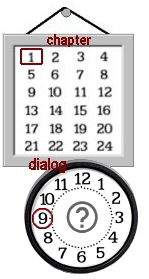Taught by Raissa Krivitsky
Course Objectives:
Reinforcing vocabulary and grammar introduced in Russian 1121; developing fluency, accuracy, and authentic flair of speech by practicing conversation in Russian on a variety of topics; learning about life and customs in Russia through acting out various situations; improving Russian pronunciation and engaging in an important aspect of Russian culture through singing Russian folk and popular songs.
Materials:
A. Lora's Dialogs. Part 1
This on-line resource with an audio component contains hundreds of four-line dialogs that suggest useful conversation patterns with room for variation and improvisation. Both fun and practical, these dialogs are not only practiced and memorized, but also serve as models for students' creativity. For detailed information on how to use this on-line resource, click here.
B. Russian Folk and Popular Songs
Russian folk and popular songs with glossaries and comments, compiled and prepared by Raissa Krivitsky, will be handed out in class as the course proceeds.
Assignments:
Click the links in the Syllabus and read, practice (with substitutions), and memorize the three dialogs assigned for the class. Prepare to recite these dialogs in class with little or no prompting. Pay special attention to using correct grammatical forms of the substitution words.
In addition to memorizing the assigned dialogs, beginning on week 5, write and bring to class a two-line dialog of your own on a related topic. For the final class of the semester, students in groups of two or more will write and perform a skit, in which each participant should recite no less than four lines. The skit may or may not include a song for extra credit.
Students are encouraged to make an individual arrangement with the instructor for a single 15 minute "pronunciation clinic" session between 4th and 8th weeks of classes.
Grading and tests:
There are no tests and no written assignments in this course. Your course grade will depend on your performance in class throughout the entire semester The grading criteria and the roughly estimated value of each component of your performance are as follows:
- Demonstrated knowledge and grammatically accurate presentation of the three assigned dialogs, 60%.
- Quality of the two-line dialogs that you write for each class with regard to the use of new vocabulary and grammatical accuracy, 20%.
- The final skit, 10%.
- Participation rate; emerging fluency; ability to maintain an improvised conversation based on familiar material and situations, 10%.
Attendance:
This course is highly interactive, therefore regular attendance is mandatory. Missing more than 3 classes without a good reason will affect your grade. It is your responsibility to notify the instructor about the nature of your absence. Advance notice will be appreciated.
 Your assignment for each class is indicated in the Syllabus.
Select a Chapter from the "calendar" and a Dialog from the "clock."
Read the Dialog, clicking on unfamiliar words for their translations.
If you know that you'll need to use an inflected form of a word
(such as a tense or case form),
click "details" in the dictionary entry to see all these forms spelled out.
Your assignment for each class is indicated in the Syllabus.
Select a Chapter from the "calendar" and a Dialog from the "clock."
Read the Dialog, clicking on unfamiliar words for their translations.
If you know that you'll need to use an inflected form of a word
(such as a tense or case form),
click "details" in the dictionary entry to see all these forms spelled out.